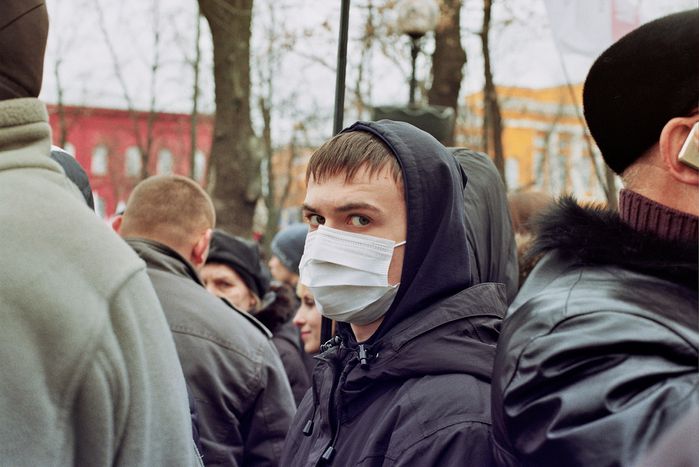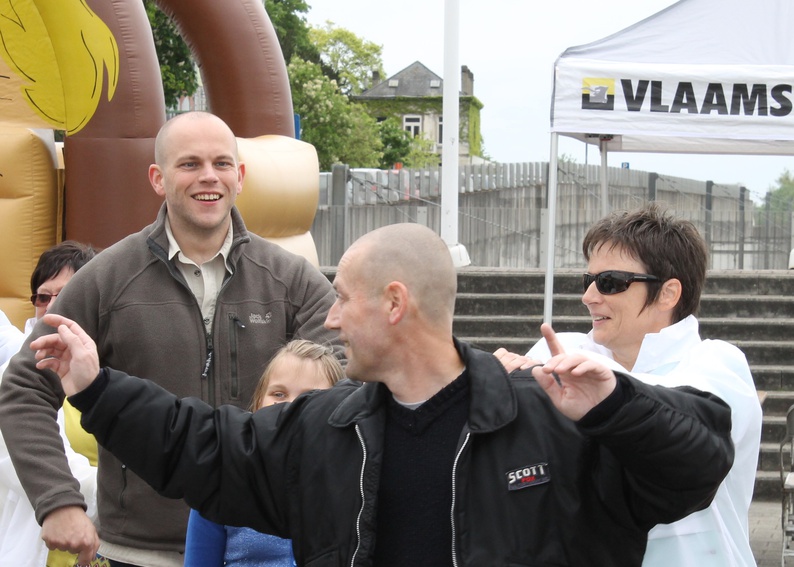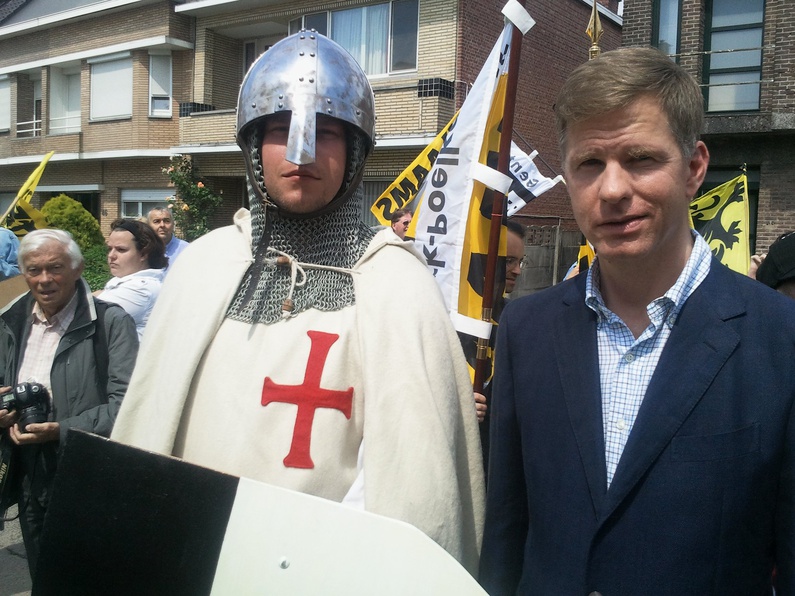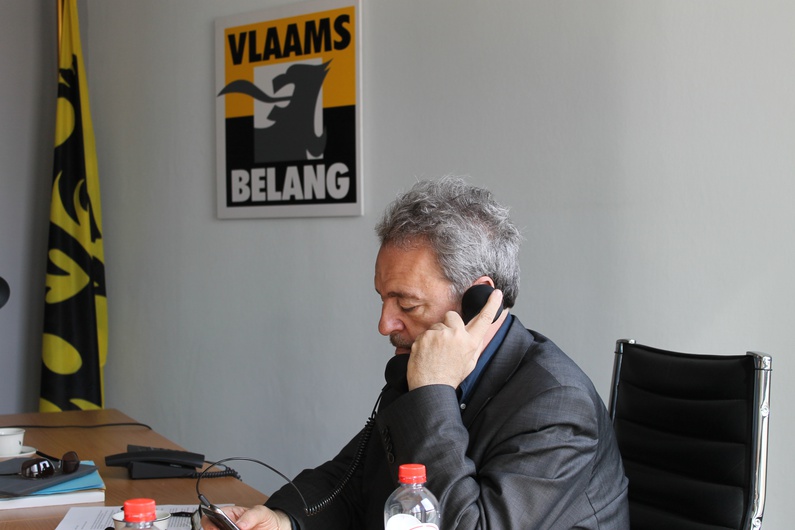
Vlaams Belang: Extremely Right, Extremely Lonely
Published on
Translation by:
 Danny S.
Danny S.
Vlaams Belang is a motley bunch of Flemish far-right separatists. They're building an anti-European alliance with the French Front National. Cafébabel went on the ground with them to see what they're really up to and what they're all about.
On a gray day in April, a bard with a bright red alcoholic's nose stands on a stage in a town near Brussels. He can't really focus his eyes on the three dozen or so followers of the extreme-right indepedence party Vlaams Belang. With swaying hips and a cheerful smile, he sings along with the Flemish folk music that the band is playing. The electoral campaign event takes place in Halle, in the Flemish region of Beligium, barely half an hour away from Brussels, the Belgian capital. Despite this, Halle seems to be in a far off, distant land. In Brussels, every language under the sun is spoken, but in the Flemish city of Halle, people prefer to speak Flemish.
Skinheads dance the polonaise
 The bouncy castle is the main attraction for children at the event. The adults wait in lines at the bar to get their beer. The politicians' speeches are received with sparse applause. Those who came here sponstaneously seem to be more in the mood for a folk festival and would rather listen to the bards. The political party seems to have receded into the background. After a conflict a couple of weeks ago between right wing extremists and antifascists, one sees neither antifascists nor police cars. When a couple of skinheads begin to dance the polonaise to the hit song "Anita," I decide to make my way back to Brussels.
The bouncy castle is the main attraction for children at the event. The adults wait in lines at the bar to get their beer. The politicians' speeches are received with sparse applause. Those who came here sponstaneously seem to be more in the mood for a folk festival and would rather listen to the bards. The political party seems to have receded into the background. After a conflict a couple of weeks ago between right wing extremists and antifascists, one sees neither antifascists nor police cars. When a couple of skinheads begin to dance the polonaise to the hit song "Anita," I decide to make my way back to Brussels.
At one point in time, Vlaams Belang was voted for by every fourth Flemish person. Today the party campaigns for recognition. The ideas for which the separatist party Vlaams Belang fight seems to be relevant for the majority of those living in Flanders. Many people in Flanders believe that the Flemish people are paying for the livelihoods of those living in the French-speaking Walloon region, and that life would be easier without French-speakers. Aside from this, many see the European Union as a threat, an excessive and unwelcome influence on their lives. These are also the positions that Vlaams Belang hold, but hardly anyone is willing to vote for them. The Nieuw-Vlaamse Alliantie (N-VA) is a national conservative party which, in recent years has made things difficult for Vlaams Belang, and it has incorporated many of the demands of the extreme right. Ever since Flemish atonomy has ceased to be the primary selling point of Vlaams Belang, they have claimed to be an anti-immigration party. "Vreemdlinge," primarly Muslims, are at fault for everything that's allegedly going wrong in Belgium.
Closed borders, more police and more deportatons
Philip Claeys leads me through the maze of the European Parliament. As we arrive in the corridor where his office is located, Claeys suddenly speaks quietly, as if to not disrupt his next-door neighbor. In parliament, the Vlaams Belang delegate is considered independent and therefore doesn't have the same rights as parliamentarians that belong to a party. That's why for the sake of the next European elections the party has spoken with Marine Le Pen from France, Geert Wilders from the Netherlands, Heinz-Christian Strache from Austria and the Swedish democrats to create a mutual party, explains Claeys, as if having such allies are necessary.
 Claeys describes himself as "politically incorrect." In his office he speaks with an almost soggy utterance about the goals of the party. According to him everyone is "over-sensitive" when immigration is raised in conversation; his party in contrast, so he claims, addresses the issue in plain-talk. He talks of "no go areas" in Brussels, ghettos and Sharia Law. He and his party conduct politics in a way that instigates fear. Their proposals read: close the borders, increase the size of the police force and increase the deportation rate of refugees, even those with approved status. As I take my leave, Claeys again speaks in a hushed tone.
Claeys describes himself as "politically incorrect." In his office he speaks with an almost soggy utterance about the goals of the party. According to him everyone is "over-sensitive" when immigration is raised in conversation; his party in contrast, so he claims, addresses the issue in plain-talk. He talks of "no go areas" in Brussels, ghettos and Sharia Law. He and his party conduct politics in a way that instigates fear. Their proposals read: close the borders, increase the size of the police force and increase the deportation rate of refugees, even those with approved status. As I take my leave, Claeys again speaks in a hushed tone.
Europe as it once was - subjugated under hitler
The office of Vlaams Belang in Brussels spans many floors. Next to the desks that are made out of a light-colored wood, black and yellow placards and flags are stacked up in piles. Gerolf Annemans, the chairman of the Party, looks a little bit like actor Bill Murray. His voice booms with the comforting depth of a contrabass. "Who placed all these flags in the office?" He says he can't really remember because he's not really a "fan of flags." He's attached an old-fashioned telephone handset to his cellphone, making his telephone conversations seem to exude importance.
For 27 years Annemans has been in the Belgian parliament, which in his opinion shouldn't exist at all. For him, Belgium should be abolished. "Why are you even a part of a parliament that shouldn't exist?" Annemans casually shrugs his shoulders. He sees the parliament as a venue where he can make his views heard.
How far right? - Discussion about new rights.
gladly taking on the role of victim
The EU for him is nothing other than a giant transfer mechanism from North to South, which disgusts him. It's the same situation in Belgium; the Flemish in the North have to pay for those that live in the southern Walloon region. During the time of Hitler, Hadrian and Napoleon, Europe, according to him, was just as artificially fabricated as the EU is today. He says this to "provoke thought." You wouldn't believe this charmer capable of giving such a history lesson.
However, here lies the missing link to the party that wouldn't ever consider itself extremist. In the front row, men dressed in perfectly tailored suits, such as Anneman and Claey, present the views of the upset flamingants, or those Flemish people who want to separate themselves from Wallonia. These men adorn their anti-immigration rhetoric with diffuse arguments about exploitation on the part of the EU and Wallonians. They gladly take on the role of victim to justify their jarring noise against "wild immigration."
 Journalist Tom Cochez wrote a book about Vlaams Belang. He tells me, that the followers of the party would like more than anything to sing "old German songs" together when they're alone. Others carry Nazi symbols under their clothes. One shouldn't allow oneself to be distracted from and intimidated by the in part bourgois appearance of party elites. For the time being, Vlaams Belang has lost significance in the Flemish party landscape. Their ideas, however, are gladly taken on by more temperate political forces. Therefore, the extreme right will not be alone when they read the results of the next election.
Journalist Tom Cochez wrote a book about Vlaams Belang. He tells me, that the followers of the party would like more than anything to sing "old German songs" together when they're alone. Others carry Nazi symbols under their clothes. One shouldn't allow oneself to be distracted from and intimidated by the in part bourgois appearance of party elites. For the time being, Vlaams Belang has lost significance in the Flemish party landscape. Their ideas, however, are gladly taken on by more temperate political forces. Therefore, the extreme right will not be alone when they read the results of the next election.
THIS ARTICLE IS PART OF A SPECIAL SERIES DEVOTED TO Brussels. IT'S PART OF EUTOPIA: TIME TO VOTE, A PROJECT RUN BY CAFÉBABEL IN PARTNERSHIP WITH THE HIPPOCRÈNE FOUNDATION, THE EUROPEAN COMMISSION, THE MINISTRY OF FOREIGN AFFAIRES AND THE EVENS FOUNDATION.


Translated from Vlaams Belang: Extrem rechts, extrem allein


